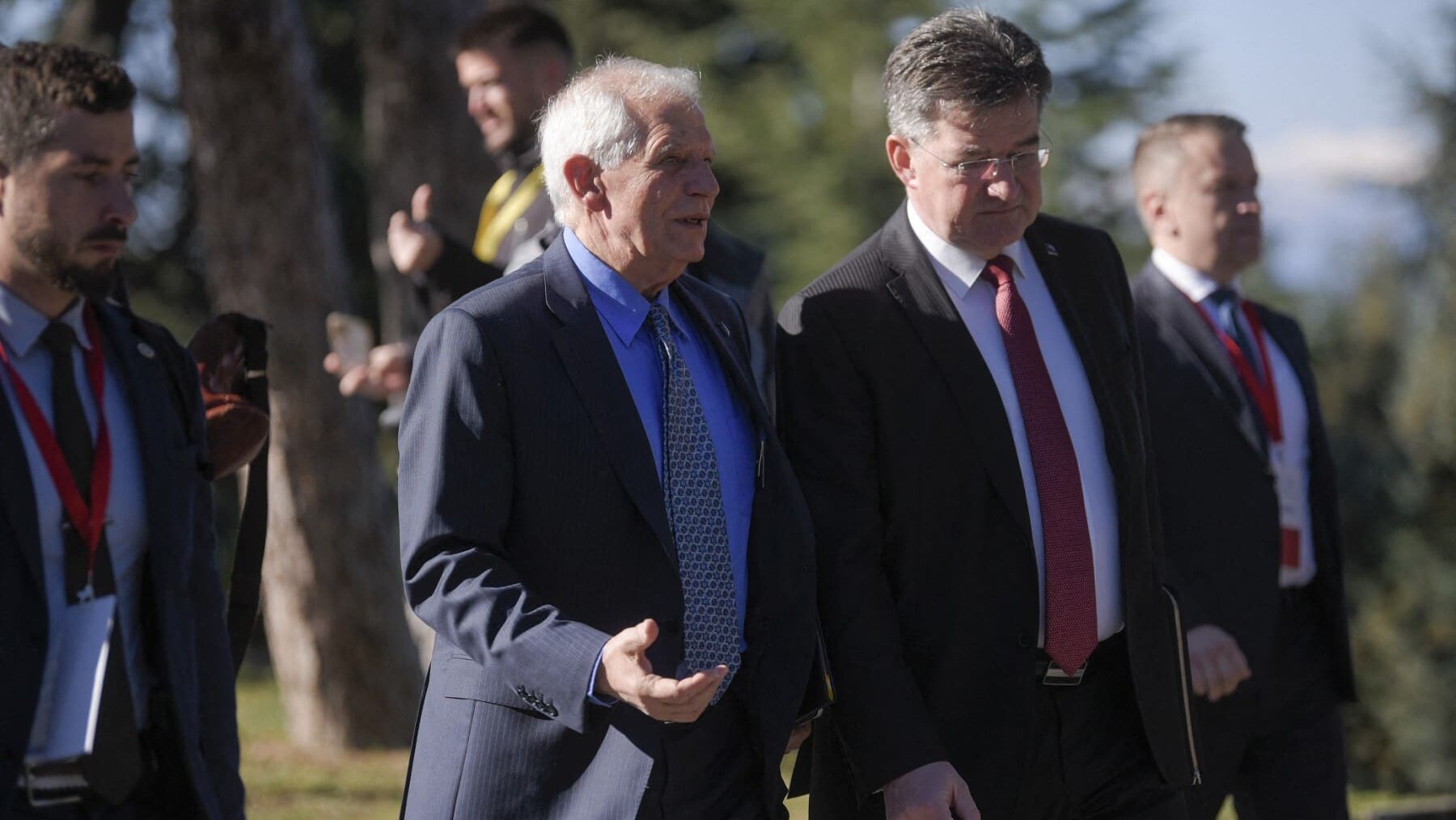
EU foreign affairs chief Josep Borrell (left) with Miroslav Lajčák, the EU’s special envoy for Serbia-Kosovo mediation, who’s being pushed for a seat in the new Commission.
Photo: Armend NIMANI / AFP
While all eyes are on the top jobs in Brussels, back-room dealing continues on the appointment of European commissioners from the 27 EU countries. Together, the 27 commissioners are the Commission’s political leadership during a five-year term and are assigned responsibility for specific policy areas by the Commission President.
Just as the top jobs haven’t reflected the will of the voters across Europe—or taken into account the views of winning parties, like Giorgia Meloni’s ECR, the negotiations on Commissioners appear to be more of the same.
One example of this is Emmanuel Macron’s lobbying for entrenched Eurocrat Thierry Breton not only to serve a second term as France’s commissioner, but also to be promoted to the powerful role of executive vice-president of the Commission with an enormous economic portfolio. This is, of course, in direct contravention to the expressed will of the French voters who chose to send Marine Le Pen’s Rassemblement National to the European Parliament in overwhelming numbers—not to mention her party’s likely huge wins in the upcoming French elections. However, as reported in its Playbook this morning, Politico notes:
A month ago, French President Emmanuel Macron backing Thierry Breton for another Commission term would have all-but guaranteed him the job. Now that’s not so certain. On his way out of the summit, Macron refused to comment on whether he—or France’s next (quite possibly far-right) prime minister—has the power to put forward a candidate. But he did endorse Breton—“he has the experience and the qualities for the job”—confirming earlier reporting in French media and POLITICO.
“How arrogant!” That’s what Macron had to say about National Rally suggesting it should get to nominate the next commissioner if it wins the snap election.
Other governments have presented their picks for commissioners, but these are not rubber stamped, either. On Wednesday evening, Slovak president Peter Pellegrini met with European Commission President Ursula von der Leyen to advocate for a place in the Commission for Maroš Šefčovič. Šefčovič has been a member of the European Commission since 2009, most recently serving as Executive Vice-President for the European Green Deal. TASR reports:
Pellegrini stressed at the meeting that Sefcovic is one of the most experienced incumbent EU commissioners, and he is a suitable candidate for an agenda concerning competitiveness, industry and energy. According to Pellegrini, von der Leyen herself “highly praised” Sefcovic’s professional qualities. Pellegrini said that he is lobbying for Sefcovic to have the backing of the Socialists and Democrats (S&D) group.
Despite the government’s backing, according to a source close to the process who spoke to us on the condition of anonymity due to the sensitive nature of the discussions, the Brussels establishment may have other plans. Our source told us that there is a backroom push for an alternative choice for a Slovak commissioner: Miroslav Lajčák.
The insider information seems to check out: rumors of former Fico foreign minister, Miroslav Lajčák, the current EU Special Representative for the Belgrade-Pristina Dialogue and other Western Balkan regional issues lobbying for the EU Commissioner job date back to April.
The Brussels establishment’s interest in Miroslav Lajčák as Commissioner is particularly odd, not only because the Slovak government has already endorsed an experienced Commissioner—meaning that the EU is trying to change the made-up mind of a member state—but because of Lajčák’s ineffectiveness as Special Representative for the Belgrade-Pristina Dialogue.
There has been no normalization of relations—in fact, relations are worse than ever, and nearly all attempts to mediate on Lajčák’s side resulted in further escalation in the past few years. Top EU diplomat, Josep Borrell, who handpicked Lajčák as Special Representative, said as much on Thursday after another failed meeting between Belgrade and Pristina:
The discussions were—as expected—as difficult as [they] always have been and, in the end, there was no trilateral meeting. Kosovo was not ready for this. Kosovo was not willing to do this trilateral meeting. Serbia was ready to do it. But you need two to dance tango, and you need two to sit around the table in order to continue the Dialogue. This has not been possible today. Unfortunately, no progress in the implementation of the Agreement could be achieved today.
We don’t know why Brussels’ old-new establishment needs Lajčák on the Commission so much, but the answer might lie in the specific portfolio they have in mind for the diplomat.
The obvious choice, given his experience in the Western Balkans, would be enlargement. EU membership is the biggest political question in many of those countries, as four of them—Albania, North Macedonia, Serbia, and Montenegro—have already begun their formal accession negotiations.
Two of them, Serbia and Montenegro, have been in open talks for over a decade now—yet, out of their 34 and 33 milestones, only two and three are deemed complete, respectively. This, in turn, led people to believe the EU is deliberately delaying the process—for political reasons, no less, as those governments might be deemed too sovereigntist to be admitted into the club—resulting in even more support for national conservative parties across the region.
Furthermore, Eurocrats have been quite open about their intention of taking the important portfolio from the current Enlargement and Neighborhood Commissioner, Olivér Várhelyi, for the sole reason that he’s Hungarian and they won’t want anyone appointed by Viktor Orbán’s government in charge of Ukraine’s fast-tracked EU membership process either.
So, maybe, Brussels is priming Lajčák to be Várhely’s replacement. However, the choice is questionable, given his track record of utter failure in mediating in the region, something the EU can not afford to continue in the coming years if it wishes to hold on to the remaining trust of its people.
